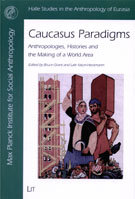Caucasus Paradigms. Anthropologies, Histories and the Making of a World Area

Author
Bruce Grant and Lale Yalçın-Heckmann (eds.)
Publisher
Berlin: LIT Verlag
Year of publication
2007
ISBN
978-3-8258-9906-6
OPAC
Abstract
What does it mean to know a world area, or to be part of one, for that matter? The most prominent of 'Caucasus paradigms' paint a picture of a region famous not only for its cultural, linguistic, religious, political, and economic pluralisms, but for its violence, sav-agery, conflict, and corruption; its nobility, hospitality, natural beauty, and severity. Such paradigms present a paradox: Despite such histories of diaspora, migration, conquest, and cohabitation, the Caucasus is most often conjured as a place of closure to those 'from outside'. This volume seeks to turn a longstanding handicap—the perceived ‘unknowability’ of the Caucasus—into a theme. Bringing together a dozen specialists in anthropology, linguis-tics, and cultural history, it identifies patterns in how the Caucasus has figured on the world stage through both politics and scholarship. By foregrounding the particular pur-chases of ethnographic knowledge alongside the fine tunings of cultural histories, it in-vites readers to reflect on pluralism and its logics in a world area where cultural differ-ence has far too long been seen as a root cause of violence. Contributors: Levon Abrahamian, Sergei Arutiunov, Georgi Derluguian, Murtazali Gadjiev, Rebecca Gould, Bruce Grant, Erin Koch, Philip L. Kohl, Rabadan G. Magomedov, Paul Manning, Shahin Mustafayev, Anton Popov, Seteney Shami, Kevin Tuite, Lale Yalçın-Heckmann
